On June 26, 2013, the U.S. Supreme Court found section 3 of the Defense of Marriage Act (DOMA) unconstitutional. See Windsor v. United States, 133 S.Ct. 2675 (2013). Section 3 of DOMA had amended the federal definition of “marriage” and “spouse”; after the enactment of DOMA “marriage” was defined as “only a legal union between one man and one woman as husband and wife”, 1 U.S.C. §7, and “spouse” referred “only to a person of the opposite sex who is a husband or a wife.” Id. DOMA precluded same-sex couples from deriving immigration benefits that were otherwise available to similarly situated heterosexual couples.
Immediately after the U.S. Supreme Court’s decision, a variety of immigration benefits became available to same-sex couples. U.S. Citizenship and Immigration Services (USCIS) and the U.S. Embassies/Consulates now adjudicate petitions and applications for same-sex couples in the same manner as similarly situated heterosexual couples. A United States citizen or lawful permanent resident (LPR) may sponsor his/her same-sex spouse and/or stepchildren to receive lawful permanent residence in the United States. A United States citizen or LPR’s eligibility to petition for his/her spouse and stepchildren, and the foreign national(s) admissibility as an immigrant at the immigrant visa application or adjustment of status phase, will be decided in accordance with applicable immigration law and will not be denied because the underlying marriage involves a same-sex couple.
While the ability to sponsor a same-sex spouse for lawful permanent residence is significant, same-sex couples may also receive immigrant or nonimmigrant visas as a qualifying beneficiary or derivative. This means that a same-sex spouse of a visa applicant coming to the United States for any purpose — including, but not limited to, work, study, international exchange or lawful permanent residence — will be eligible for the appropriate derivative visa status. Stepchildren acquired through a same-sex marriage may also qualify as beneficiaries or derivatives. A United States citizen who is engaged to be married to a foreign national of the same sex may also seek a fiancé(e) visa on behalf of his/her foreign national fiancé(e). In addition, abused spouses and stepchildren from same-sex marriages may also be able to self-petition for lawful permanent residence under the Violence Against Women Act (VAWA) where the abuser was a United States citizen or LPR.
With the exception of a fiancé(e), to be eligible for an immigrant or nonimmigrant visa as a qualifying beneficiary or derivative, the same-sex couple must be married. The marriage must be valid in the U.S. state or foreign country where it occurred to be valid for immigration purposes. Same-sex couples who live in a state or foreign country that does not recognize same-sex marriage may enter into a valid marriage for immigration purposes by marrying in a state or foreign country that recognizes marriage equality so long as the applicable laws allow out-of-state couples to marry there. Neither USCIS nor the U.S. Embassies/Consulates will recognize a civil union or domestic partnership for immigration purposes.





